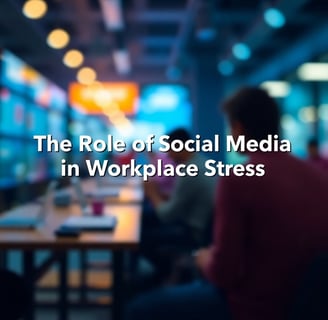
The Role of Social Media in Workplace Stress
How does social media contribute to workplace stress? In "The Role of Social Media in Workplace we delve into the hidden challenges and offer actionable solutions to help professionals navigate the digital maze. Discover surprising insights that can transform your work-life balance and productivity.
WORKPLACE STRESS
12/23/20246 min read
In today’s hyper-connected world, the role of social media in workplace stress has emerged as a critical topic for professionals and organizations alike. As employees increasingly integrate social media into their work and personal lives, understanding how it influences workplace stress becomes essential for fostering healthier, more productive environments. Social media’s pervasive presence requires a nuanced approach to manage its benefits and mitigate its challenges effectively.
From enhancing communication and collaboration to becoming a source of distractions and mental strain, social media's dual role in the workplace calls for actionable insights and strategies to strike a balance. Our previous article on technology overload highlights the overwhelming effects of constant connectivity, which can contribute to workplace stress. Furthermore, the article on remote work and stress discusses the added complexities of managing an online presence while working remotely, where social media can blur the lines between work and personal life.
The increasing overlap of digital tools and professional responsibilities makes it imperative for both individuals and organizations to address this issue comprehensively. In our article on the financial cost of stress we underlined the direct impact that digital-related stress, including social media, can have on productivity. It is important to recognize that creating a healthy work culture with policies and practices to reduce stress is the need for organizations. This need can be satisied in such a way that organisations establish clear guidelines around the use of social media in the workplace to mitigate stress.
Moreover, mindfulness at work provides strategies for managing the mental strain caused by the pressure to maintain an online presence. In addition, the inablity to recognize and address toxic work environments could be linked to the stress exacerbated by social media, especially when negative online interactions or excessive digital exposure contribute to a harmful workplace culture.
By incorporating these strategies and recognizing the role of social media in both positive and negative aspects of work life, professionals and organizations can better manage the pressures associated with our increasingly digital world.
The Role of Social Media in Workplace Stress: Balancing Online Presence and Professional Pressure
The Role of Social Media in Workplace Stress lies at the intersection of digital engagement, mental health, and professional dynamics. Social media, while a valuable tool for communication and networking, can amplify stress due to excessive use, workplace distractions, and harmful social comparisons. The dual-edged nature of social media—as both a facilitator and a disruptor—makes it a significant factor in modern workplace environments.
Employees often find themselves struggling to manage their online presence while meeting the expectations of their professional roles. This dynamic can create significant pressure, as the boundaries between personal and professional lives become increasingly blurred. Below, we explore the various ways in which social media contributes to workplace stress and examine actionable strategies for fostering balance.


How Does Social Media Contribute to Workplace Stress?
Social media’s impact on workplace stress arises from multiple interconnected factors, each adding a layer of complexity to the modern work environment. From distractions to social comparisons, these elements shape the way we experience workplace stress in profound ways.
Distractions and Productivity Loss:
We’ve all experienced how excessive social media use during work hours can detract from our focus and productivity. Research, like that of Alzaabi & Alshehhi (2023), shows that unchecked social media use leads to diminished job performance, reducing our effectiveness. It’s easy to fall into the trap of scrolling through feeds, losing sight of critical tasks and, ultimately, our productivity.Social Comparison:
It’s hard not to compare ourselves when social media is filled with idealized portrayals of others, and it’s something we often do without thinking. Han et al. (2020) highlight that social media platforms encourage upward social comparisons, leading us to feel inadequate or burned out. These comparisons can amplify stress by setting unrealistic expectations for ourselves, adding weight to our already full plates.Stress from Constant Engagement:
For many of us, social media becomes a coping mechanism during overwhelming work demands. However, according to Brailovskaia et al. (2022), this constant engagement only deepens the stress. The addictive nature of staying connected paradoxically leaves us feeling more burdened and less satisfied with our lives.Occupational Stress Amplification:
When we turn to social media for personal reasons during work hours, as De Alwis & Kollonna (2019) found, we can unintentionally heighten our occupational stress. This behavior often blurs the boundaries between our personal and professional lives, creating an “always-on” culture that chips away at our mental well-being.Exposure to Workplace Conflicts:
Engaging with workplace discussions or conflicts on social media can bring heightened stress. It’s easy for online platforms to escalate tensions, and before we know it, the pressure and insecurity felt at work follow us into our personal lives, increasing our overall stress.




The Psychological Toll of Social Media-Driven Stress
The toll social media takes on our mental health goes beyond these immediate effects. The addictive nature of social media, combined with workplace expectations, can lead to a range of psychological struggles, such as anxiety, depression, and burnout.
We often feel the pressure to maintain a polished online persona, which compounds the stress of everyday work. Even more so, social media’s role as a coping mechanism may backfire, as over-reliance on it can actually increase stress.
The constant influx of information, notifications, and digital interactions only adds to the feeling of being overwhelmed.
Educating Employees on Responsible Social Media Use
We must understand how social media impacts our work life, and organizations can play a crucial role in raising awareness.
Conducting workshops can help us recognize the risks of excessive social media use, such as productivity loss and social comparison.
Employers can share techniques to maintain a balanced online presence and offer resources to help us identify signs of social media addiction. These initiatives should encourage mindfulness in our digital habits, equipping us to make better choices and use social media in a healthier way.


Implementing Clear Social Media Policies
We also need clear boundaries around social media use during work hours. Policies should define acceptable social media use while encouraging periodic breaks to reset and avoid burnout.
This balance of flexibility and accountability helps ensure that we stay productive without feeling the pressure of constantly being “on.” Clear policies can provide structure, creating a sense of security and accountability for everyone involved.
Encouraging Healthy Digital Habits
Organizations can help us cultivate healthier digital habits, reducing the negative impact of social media. One solution is implementing digital detox programs, where regular breaks or “no-screen” hours allow us to disconnect.
These programs can be complemented by team-building activities that encourage face-to-face interaction. Additionally, mindfulness training can help us manage stress effectively. Practices like meditation and deep breathing, integrated into our workday, can improve focus and relaxation.
Time management tools, such as apps to limit social media use during work hours, can also give us more control over our schedules, reducing distractions and improving overall productivity.


Leveraging Social Media for Positive Engagement
When used responsibly, social media can actually enhance workplace connections. We can leverage platforms to recognize achievements, fostering a culture of appreciation. Promoting peer support groups focused on wellness or shared hobbies can help us bond over interests outside of work, providing much-needed stress relief. Encouraging the sharing of inspirational content and success stories can further create a positive, uplifting digital environment, which, in turn, helps to mitigate stress.
Supporting Employees Through Technology
Technology can also be a powerful tool to alleviate stress. By offering access to digital mental health resources, like counseling apps and wellness platforms, organizations can provide support beyond traditional means.
Additionally, leveraging analytics to monitor social media use can help identify patterns of overuse, allowing for proactive intervention before stress becomes overwhelming.


Conclusion
Looking at the role of social media in workplace stress, we see that balance is key. To navigate this challenge effectively, we must all play a part. Organizations should promote responsible social media use and establish policies that mitigate its negative effects.
As employees, we should cultivate self-awareness and adopt healthier engagement practices. By addressing these challenges collaboratively, we can create workplaces that harness the benefits of social media without falling prey to its stress-inducing aspects.
Ultimately, the goal is to build resilience in the digital workplace. With a shared commitment to creating an environment where technology serves as a tool for growth rather than a source of stress, we can prioritize both our mental well-being and professional success. Through education, policy, and empowerment, we can collectively navigate the complexities of social media and create a healthier, more productive workforce.
References:
Alzaabi, Y. S. R., & Alshehhi, S. M. A. (2023). The Negative Effects of Social Media Usage on Employee Performance – A Conceptual Analysis. International Journal of Intellectual Human Resource Management (IJIHRM), 4(2), 40-47.
Han, R., Xu, J., Ge, Y., & Qin, Y. (2020). The Impact of Social Media Use on Job Burnout: The Role of Social Comparison. Frontiers in Public Health, 8, 588097.


